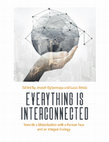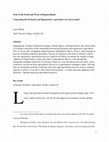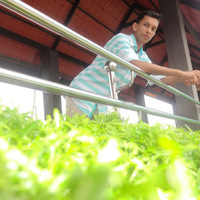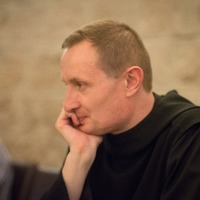Books by Lucas Briola

No other encyclical has generated as much conversation―both Catholic and non-Catholic―as Laudato ... more No other encyclical has generated as much conversation―both Catholic and non-Catholic―as Laudato si'. Often forgotten in these conversations is the theological heart and eucharistic vision of the encyclical and its integral ecology. Even the title of Laudato si'―"Praised be!"―signals the centrality of right praise in caring for our common home. Using Bernard Lonergan's theology of history, this book unearths the doxological, eucharistic vision that shapes the encyclical's integral presentation of social and ecological conversion. It offers the first book-length study that recovers the eucharistic nature of Laudato si'.
In drawing out the eucharistic vision of Laudato si', the book accomplishes several feats for the reader. It roots the eucharistic dimensions of the encyclical in the writings of Popes John Paul II and Benedict XVI, showing how Pope Francis develops their thought in notable ways. It introduces Bernard Lonergan's theology of history, showing how his framework can capture the eucharistic contours of caring for our common home; so too, in light of Laudato si', does the book expand his theology of history to incorporate both ecological concern and the doxological, eucharistic essence of the church. The book assembles a liturgically shaped, systematic account of the church's social mission. It joins poles otherwise sundered in a polarized church and world: between worship and justice, between concerns for human life and concerns for the natural world. Realizing the eucharistic vision of Laudato si' promises much for our contemporary moment.
Pope Francis recently observed that the integral ecology of Laudato si' holds the key for the world's recovery from the COVID-19 pandemic. The U.S. Catholic Bishops recently launched a Eucharistic Revival that aims to rekindle eucharistic devotion and praxis. The Eucharistic Vision of Laudato Si': Praise, Conversion, and Integral Ecology supplies a timely study that helps fulfill these intertwined calls.

Today’s overlapping social and ecological crises portend Bernard Lonergan’s memorable remark that... more Today’s overlapping social and ecological crises portend Bernard Lonergan’s memorable remark that “the world lies in pieces before us and pleads to be put together again.” The calls of Catholic social teaching for a “humane globalization” and, more recently in Laudato si’, an “integral ecology” only heighten the urgency of this task. Inspired and aided by Lonergan’s thought, this volume presents an array of essays that collectively aspire to answer these pleas. Engaging theology, philosophy, the social sciences, and the natural sciences, the volume’s authors hope to show how in fact “everything is interconnected” in the church’s ongoing task of caring for our common, though fragmented, home.
This volume stands as the first publication of the International Institute for Method in Theology. Launched in 2017 by Fr. Robert Doran, S.J.—and through the joined efforts of the Marquette Lonergan Project, the Lonergan Research Institute at Regis College (University of Toronto), and the theology faculty of the Gregorian University (Rome)—the Institute aims to implement Bernard Lonergan’s “generalized empirical method” across disciplines through global collaboration.
https://www.amazon.com/Everything-Interconnected-Globalization-Integral-Marquette/dp/1626007187
http://shop.btpubservices.com/Title/9781626007185
Articles by Lucas Briola
A preview of a forthcoming book with Liturgical Press.
This article is an open access article distributed under the terms and conditions of the Creative... more This article is an open access article distributed under the terms and conditions of the Creative Commons Attribution (CC BY

Engaging the writings of Bernard Lonergan, Charles Massy, and Pope Francis, this article offers a... more Engaging the writings of Bernard Lonergan, Charles Massy, and Pope Francis, this article offers a systematic exposition of the relationship between the Eucharist and regenerative agriculture. First, it surveys the overlapping cultural malaises identified by Massy, Francis, and Lonergan at the root of modern industrial agriculture. Second, in response to this form of decline, it shows how the regenerative agricultural practices called for by Massy instantiate the integral ecology called for by Pope Francis; at the same time, it substantiates Massy's calls through the emergently probable worldview of Lonergan. Third, in a way that Massy does not show, such a worldview can elevate these agricultural concerns to a supernatural, redemptive plane. Not only does an emergently probable worldview show that right agricultural practices restore creation's capacity to praise, so too does it show that Christian praise-as made especially apparent in the Eucharist-depends upon just agricultural practices.
*** 2021 Award for Best Journal Article, College Theology Society
http://shop.btpubservices.com/Title/9781626007185
http://shop.btpubservices.com/Title/9781626007185

LRICH LEINSLE BEGINS his Introduction to Scholastic Theology with an attempt to define scholastic... more LRICH LEINSLE BEGINS his Introduction to Scholastic Theology with an attempt to define scholasticism over the course of fifteen pages, only coming to conclude that "an unequivocal definition of 'Scholasticism' does not seem possible." 1 This lack of clarity has a simple explanation. Though sometimes seen as a smooth monolithic structure unaffected by the confines of time, medieval scholasticism can be more appropriately imaged as an ongoing debate spanning centuries, a debate that would greatly affect the future of Christian theology. The increasing desire to rationally articulate the faith alongside the ongoing development of sacramental traditions meant that attempts to express theologies of the sacraments provided some of the most heated and nuanced scholastic debates. Penance was no exception, reaching a developmental turningpoint in the twelfth-century, particularly when considered by two of the most prominent theologians and "pioneers of sacramental theology" of the time-Peter Abelard and Peter Lombard. 2 Because an adequate theology of the sacrament was only beginning to be formulated during this time, a study of this time period elucidates some interesting and important points for an adequate notion of penance. Additionally, medieval scholastic theology cannot be understood apart from its context, inarguably affected and conditioned by other historical and cultural currents. Taking this broader theo-cultural milieu into account, this essay deals with two key scholastic debates over penance. First, I will locate Abelard and Lombard as contritionalists-those who assert that God's forgiveness occurs at contrition rather than confession-and consequently consider their respective views on the necessity of confession. Second, since both acknowledge that God's forgiveness comes at contrition rather than confession, I will examine how this position changes the role of priests for the two thinkers, as priests are now considered judges or doctors who need to
Book Reviews by Lucas Briola

Laudato Si' renewed attention to a rich though often forgotten theological theme: creation praisi... more Laudato Si' renewed attention to a rich though often forgotten theological theme: creation praising God. The theme carries both biblical sanction (e.g., the Psalms) and theological precedent (e.g., Augustine). Amid increasing environmental concern, the doxological orientation of creation also carries a prophetic bite. Only a few, however, have discussed the meaning of this evocative language in any systematic manner. In Nature Praising God, Irish priest Dermot Lane provides some foundations for such sustained exploration. A constellation of related questions guides L.: "What does it mean to say that nature praises God? How is it possible for the natural world to sing the praises of God?.. . How can there be the praise of God without the exercise of free will?" (16). L. submits what might be read as a "maximalist" answer to these questions. He rules out anthropocentric interpretations that suggest nature elicits humans' praise of God, eschatological interpretations that reserve this praise for the end of time, and metaphorical interpretations that attribute such odd-sounding claims to rhetorical flourish. Grounding his work in "a nature-based Pneumatology" and "a naturebased Christology," L. argues that nature's capacity to praise points to its intrinsic value and some level of autonomous agency: nature is "a subject praising God" (107). The recognition of this capacity, L. argues, can counter anthropocentric worldviews and utilitarian approaches to nature. Meditating on this doxological capacity offers fruit not only for our common home but for the church. It can link conversations about liturgy with conversations about environmental justice, conversations often siloed from each other. L. offers a helpful starting point to those types of conversations. For instance, Orthodox theology receives virtually no treatment in the book. How might the priestly anthropology of someone like John Zizioulas aid (or complicate) a project like L.'s? L. most insightfully suggests that the Christian doctrine of creatio ex nihilo grounds the doxological capacity of creation (94-97). At one point, L. admits that his "thesis about creation's praise of God is only sustainable on a number of assumptions scattered throughout this book" (103). Indeed, more work remains to assemble the pieces!










Uploads
Books by Lucas Briola
In drawing out the eucharistic vision of Laudato si', the book accomplishes several feats for the reader. It roots the eucharistic dimensions of the encyclical in the writings of Popes John Paul II and Benedict XVI, showing how Pope Francis develops their thought in notable ways. It introduces Bernard Lonergan's theology of history, showing how his framework can capture the eucharistic contours of caring for our common home; so too, in light of Laudato si', does the book expand his theology of history to incorporate both ecological concern and the doxological, eucharistic essence of the church. The book assembles a liturgically shaped, systematic account of the church's social mission. It joins poles otherwise sundered in a polarized church and world: between worship and justice, between concerns for human life and concerns for the natural world. Realizing the eucharistic vision of Laudato si' promises much for our contemporary moment.
Pope Francis recently observed that the integral ecology of Laudato si' holds the key for the world's recovery from the COVID-19 pandemic. The U.S. Catholic Bishops recently launched a Eucharistic Revival that aims to rekindle eucharistic devotion and praxis. The Eucharistic Vision of Laudato Si': Praise, Conversion, and Integral Ecology supplies a timely study that helps fulfill these intertwined calls.
This volume stands as the first publication of the International Institute for Method in Theology. Launched in 2017 by Fr. Robert Doran, S.J.—and through the joined efforts of the Marquette Lonergan Project, the Lonergan Research Institute at Regis College (University of Toronto), and the theology faculty of the Gregorian University (Rome)—the Institute aims to implement Bernard Lonergan’s “generalized empirical method” across disciplines through global collaboration.
https://www.amazon.com/Everything-Interconnected-Globalization-Integral-Marquette/dp/1626007187
http://shop.btpubservices.com/Title/9781626007185
Articles by Lucas Briola
Book Reviews by Lucas Briola
In drawing out the eucharistic vision of Laudato si', the book accomplishes several feats for the reader. It roots the eucharistic dimensions of the encyclical in the writings of Popes John Paul II and Benedict XVI, showing how Pope Francis develops their thought in notable ways. It introduces Bernard Lonergan's theology of history, showing how his framework can capture the eucharistic contours of caring for our common home; so too, in light of Laudato si', does the book expand his theology of history to incorporate both ecological concern and the doxological, eucharistic essence of the church. The book assembles a liturgically shaped, systematic account of the church's social mission. It joins poles otherwise sundered in a polarized church and world: between worship and justice, between concerns for human life and concerns for the natural world. Realizing the eucharistic vision of Laudato si' promises much for our contemporary moment.
Pope Francis recently observed that the integral ecology of Laudato si' holds the key for the world's recovery from the COVID-19 pandemic. The U.S. Catholic Bishops recently launched a Eucharistic Revival that aims to rekindle eucharistic devotion and praxis. The Eucharistic Vision of Laudato Si': Praise, Conversion, and Integral Ecology supplies a timely study that helps fulfill these intertwined calls.
This volume stands as the first publication of the International Institute for Method in Theology. Launched in 2017 by Fr. Robert Doran, S.J.—and through the joined efforts of the Marquette Lonergan Project, the Lonergan Research Institute at Regis College (University of Toronto), and the theology faculty of the Gregorian University (Rome)—the Institute aims to implement Bernard Lonergan’s “generalized empirical method” across disciplines through global collaboration.
https://www.amazon.com/Everything-Interconnected-Globalization-Integral-Marquette/dp/1626007187
http://shop.btpubservices.com/Title/9781626007185